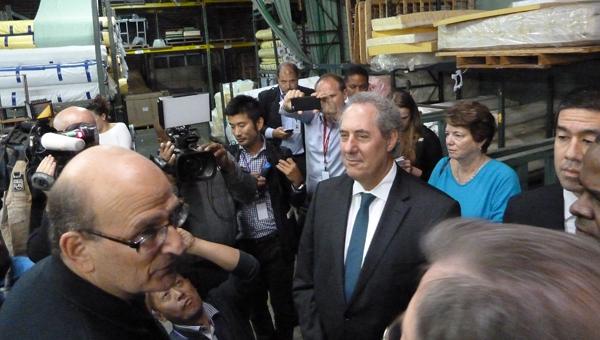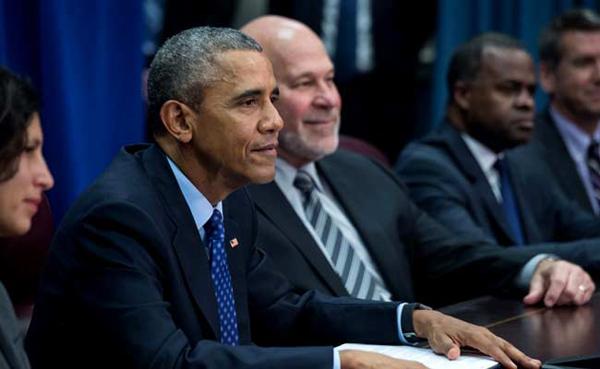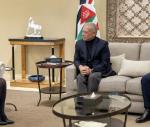You are here
Pacific trade negotiators reach landmark deal, fight over approval looms
By Reuters - Oct 05,2015 - Last updated at Oct 05,2015

In this October 1 photo, US Trade Representative Michael Froman (centre) takes a break from negotiations on the Trans-Pacific Partnership trade treaty in Atlanta, Georgia, to visit the Colgate Mattress Factory (AFP photo)
ATLANTA — The United States and 11 other Pacific Rim countries have reached a deal on the most sweeping trade liberalisation pact in a generation but the accord on Monday faced initial skepticism in the US Congress.
In a deal that could reshape industries and influence everything from the price of cheese to the cost of cancer treatments, the 12 countries will cut trade barriers and set common standards. Details of the pact were emerging in statements by officials after days of marathon negotiations in Atlanta.
The Trans-Pacific Partnership (TPP) would affect 40 per cent of the world economy and stand as a legacy-defining achievement for US President Barack Obama, if it is ratified by Congress. Lawmakers in other TPP countries must also approve the deal.
Initial reaction from key US lawmakers was skeptical.
Vermont Senator Bernie Sanders, a US Democratic presidential candidate, said he was disappointed and warned the pact would cost US jobs and hurt consumers.
"Wall Street and other big corporations have won again," he indicated in a statement, vowing to "do all that I can to defeat this agreement" in Congress.
Senate Finance Committee Chairman Orrin Hatch, a Republican, said he feared the TPP could fail to break down trade barriers for American-made products.
"While the details are still emerging, unfortunately I am afraid this deal appears to fall woefully short," Hatch added.
The TPP has been controversial because of the secret negotiations that have shaped it over the past five years and the perceived threat to interest groups from Mexican auto workers to Canadian dairy farmers.
Obama said the pact will "level the playing field" for American workers and businesses and added that Americans would have months to read the deal before he signs it into law.
Biotech compromise
The trade talks had snared on the question of how long a monopoly period should be allowed on next-generation biotech drugs, until the United States and Australia negotiated a compromise.
Although the complex deal sets tariff reduction schedules on hundreds of imported items from pork and beef in Japan to pickup trucks in the United States, the issue of the length of the monopolies awarded to the developers of new biological drugs had threatened to derail talks until the end.
Negotiating teams had been deadlocked over the question of the minimum period of protection to the rights for data used to make biologic drugs, made by companies including Pfizer Inc., Roche Group's Genentech and Japan's Takeda Pharmaceutical Co.
The United States had sought 12 years of protection to encourage pharmaceutical companies to invest in expensive biological treatments like Genentech's cancer treatment Avastin. Australia, New Zealand and public health groups had sought a period of five years to reduce drug costs and the burden on state-subsidised medical programmes.
Negotiators agreed on a compromise on minimum terms that was short of what US negotiators had originally sought and that through a two-track process would effectively grant biologic drugs a minimum period of 5 years and up to a minimum of 8 years, aiming to achieve a comparable outcome across both tracks, free from the threat of competition from generic versions.
A politically charged set of issues surrounding protections for dairy farmers was also addressed in the final hours of talks, officials said. New Zealand, home to the world's biggest dairy exporter, Fonterra, wanted increased access to US, Canadian and Japanese markets.
Separately, the United States, Mexico, Canada and Japan agreed rules governing the auto trade that dictate how much of a vehicle must be made within the TPP region in order to qualify for duty-free status.
The North American Free Trade Agreement between Canada, the United States and Mexico mandates that vehicles have a local content of 62.5 per cent. The way that rule is implemented means that just over half of a vehicle needs to be manufactured locally. It has been credited with driving a boom in auto-related in investment in Mexico.
The TPP would give Japan's automakers, led by Toyota Motor Corp, a freer hand to buy parts from Asia for vehicles sold in the United States but sets long phase-out periods for US tariffs on Japanese cars and light trucks.
The deal being readied for expected announcement later Monday also provides minimum standards on issues ranging from workers' rights to environmental protection and sets up dispute settlement guidelines between governments and foreign investors separate from national courts.
Related Articles
WASHINGTON — US President Barack Obama took a dig at China Saturday as he defended the new Trans-Pacific Partnership (TPP) free-trade deal,
TOKYO — Asian members of the newly-minted Trans-Pacific Partnership (TPP) Tuesday hailed the deal to create the world’s largest free trade a
The 12-nation Pacific trade pact would create nearly a quarter of a million US jobs due to increased foreign investment in the United States, a business group estimated on Monday, in the first look at the deal's employment impact.

















